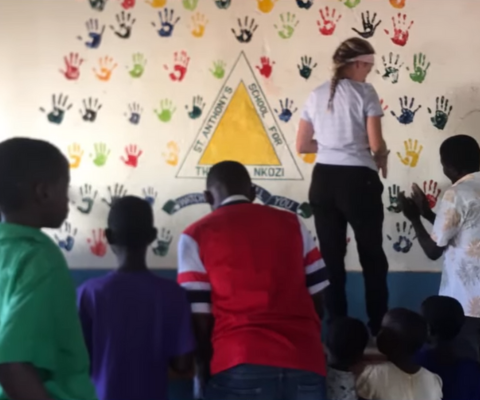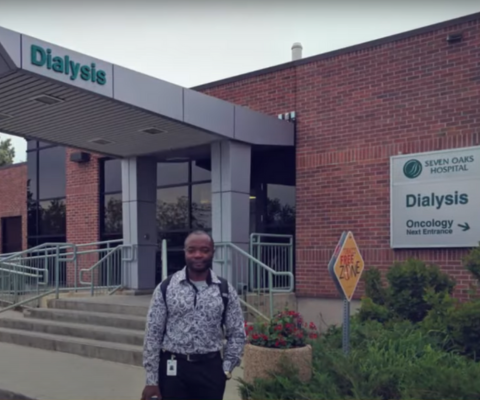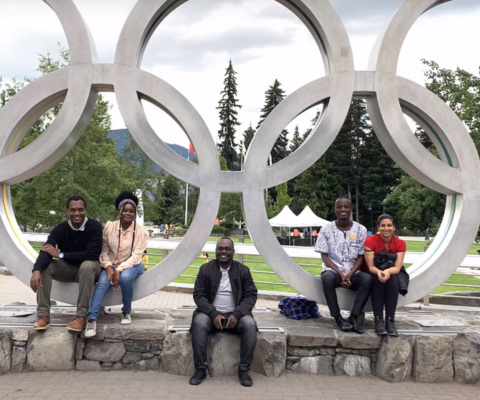Le gouverneur général du Canada : Un appel à l’action pour le Canada
Texte sur l’écran : [Logo de Canada 150]
Texte sur l’écran : [Converge 2017
Bright Minds. Bright Future.]
Texte sur l’écran : [Carrefour 2017
De l’esprit de l’avenir.]
Texte sur l’écran : [What kind of Canada do we want in the next 50 years?
Quel avenir souhaitons-nous pour le Canada d’ici 50 ans?]
Texte sur l’écran : [February 6-7, 2017
6 et 7 février 2017
Ottawa]
Son Excellence le très honoravble David Johnston :
Well, Shelagh, Elizabeth, friends, what a delight to be here. The only amendment I’d make to that very generous introduction by my great friend Elizabeth is she indicated that Sharon and I raised five daughters. It’s the reverse. The five daughters have raised especially their father which has been a great challenge, but I say I’m the most improved man in the world because every morning six women get up and say “how do we improve dad today? Because he slipped back so much overnight.” All the important things in life I’ve learned from my children. I say that not entirely in jest.
And what a treat to hear from Firaz, Zoe and Simone, those magnificent declarations that speak to the future of our country. Firaz who referred to the Queen Elizabeth Scholars. You must be a founder, Firaz. You would be in the first cohort of the Queen Elizabeth Scholars, and emphasizing what I call a diplomacy of knowledge. Think of that concept, the diplomacy of knowledge and helping us to be global citizens. Zoe with that great story being the first in her family, isn’t that a Canadian story? The first in a family to get a higher education, the great promise of Canada, and then emphasizing the challenge for all of us with reconciliation to make Canada whole through reconciliation, our 2017 project. And Simone beginning with posing (ph) the challenges for us, hein, the challenges which for me is encapsulated in that great statement of John Gardner (ph), Secretary of Education in the United States some 40-50 years ago. Can we have a quality of opportunity and excellence too? The quality of opportunity and excellence too, to see those are not mutually conflicting objectives but mutually reinforcing objectives. That’s the great challenge for Canada, equality of opportunity and excellence too.
So let me begin. Canada, a nation of losers. That’s right, losers! I bet you weren’t expecting to hear that from the Governor General today, were you? But that was the opinion of Hugh MacLennan. How many of you know Hugh MacLennan’s works? Those who haven’t, you have a treat in store from Hugh. He was a five time winner of the Governor General Literary Awards, that going back to the first one. They were first awarded in 1937 when John Buchan when Lord Tweedsmuir was Governor General. He was one of Canada’s greatest novelists of the 20th century. But he said that as praise, not as an insult, praise.
Pour Hugh MacLennan, nous traiter de perdants était un compliment et non une insulte.
By calling us all losers, he meant that many Canadians with the notable exception when he was writing of indigenous people. Many Canadians came to Canada from abroad out of necessity. De nombreux Canadiens venus ici par nécessité fuyaient la guerre et fuyaient la faim. They were fleeing oppression. They were fleeing lack of opportunity. But what were they fleeing to? Well, the opposite of those things. They came for peace, for prosperity, for tolerance for opportunity. They chose to come to Canada from oppressive situations because they wanted life to be better for their children and their grandchildren and the communities in which they lived.
C’est ce que le Canada représentait pour bon nombre de nos parents, grands-parents et ancêtres lointains qui sont venus ici pour prospérité, tolérance et opportunité. Peace, prosperity, tolerance, opportunity. Pretty attractive, no? All four ingredients, all four ingredients are essential, but I believe the last two, tolerance and opportunity, are the foundation of Canada’s success past, presence and future.
Sans tolérance ni possibilité, autrement dit sans inclusivité il ne peut y avoir ni paix ni prospérité. An inclusive country, theme one. Where Canada has succeeded, it has been through a commitment to inclusiveness, an understanding of and respect for difference. And more than that, our success stems from our diversity. It gives us strength. Where Canada has failed in the past, for example the disastrous residential school policy, it has been in trying to reduce diversity and restrict inclusiveness. Canadian society is at its best when it mirrors its geography broad, expansive, inclusive.
La beauté du Canada et la chose vraiment novatrice c’est que nous pouvons incarner plusieurs de ces réalités à la fois. One of my predecessors I mentioned a moment ago, John Buchan and Lord Tweedsmuir, author of 120 books, and writing was a part-time occasion for him. Just think of that, 120 books, not a small accomplishment. I think of Lord Tweedsmuir as I’m sitting in my office with a pile of stuff like that at ten o’clock in the morning and I look at Buchan’s name on the wall, all the names of the previous governor general there, and I say Buchan would have had this done before breakfast. He’d be writing the sequel to Thirty-Nine Steps or some of the great novels. But he was born in Scotland which explains a lot. The son of the Presbyterian minister, and he served as Canada’s Governor General from 1935 to 1940, years which saw the outbreak of the Second World War.
Despite those difficult years, he was very optimistic about this country. And Buchan was among the first to articulate an essential of Canada, inclusiveness. John Buchan a compris que nous sommes plus forts lorsque nous embrassons la diversité. Il voyait la clé de la paix et la prospérité. C’est encore le cas. In 1936 for example, Buchan told a group of people of Ukrainian origin who’d settle in Manitoba that you will all be better Canadians for being also good Ukrainians. Now just think about that for a moment. Not merely you can be both Canadian and Ukrainian, but you will be a better Canadian for honouring your Ukrainian identity.
The same applies to any hyphenated identity you can think of. Respect who you are and where you’ve come from and respect where you are and where we are going together. In Canada, you can do both.
Second theme: Canada’s moment. Pensez à la façon dont cette notion de respect et de promotion de la diversité est devenue une réalité incontournable qui est parfaitement adaptée au monde dans lequel nous vivons aujourd’hui. Our world, a trite (ph) statement, is complex, diverse, globalized and changing very fast. In fact, the rate of change is accelerating. I commend you Tom Friedman’s latest book, Thanks for Being Late, nothing late about this epoch and the remarkable thing that Freedman writes about and I’ll quote him a little later is that the pace of chance is actually accelerating exponentially and how we grapple with that is so key.
The fourth industrial revolution, the one that comes after digital, is all about emerging technology. It’s the stuff of science fiction. In fact, science fiction writers are having trouble writing science fiction these days because it’s become science fact: the Internet of things, artificial intelligence, robotics, 3D printing, biotech, self-driving cars, nanotechnology on and on. And like the first, second and third industrial revolutions, the fourth is having quite profound effects in our lives. It’s what revolutions do. And our capacity in terms of social interactions to deal with this extraordinarily rapid and accelerating technological revolution is very challenging indeed.
In such times, our thinking, our behaviour, our laws and institutions and our learning must adapt and keep pace. Nous devons accepter qu’un changement se produira que nous le voulions ou non. The only question is to what extent do we shape that change? Well, put another way, how do we avoid becoming its victims? The Pulitzer Prize winning author, writer, Thomas Friedman, I mentioned a moment ago calls this the “age of accelerations” plural, the age of accelerations. “When people and societies are being challenged by the rapid circulation of ideas and change in virtually all spheres of life how we respond”, he writes, “will determine our success in navigating this historical moment.”
Darwin once said it is not the most powerful of the strongest of the species that will survive, it’s the most resilient. To quote Friedman, he says: “Those societies that are most open to flows of trade” flows of trade, flows of trade, “information, finance culture education and those most willing to learn from them and contribute to them are the ones most likely to thrive in the age of accelerations. Those that can’t will struggle.” And he focuses on the flow of information, not the grasp of the information, not the recording of facts, the storing of data in the brain, but the flow and the ability to participate fully in that.
The title of this conference, Converge, is very apt. This is exactly what’s happening in this age of accelerations: rapid, profound, convergence on a global scale. And so, how do we help shape that change rather than merely react? That’s our challenge. That’s your challenge. Que peut-on faire pour contribuer à façonner ce changement plutôt que de simplement y réagir? Voilà, notre défi. Voilà, votre défi.
It’s our 150th birthday. I believe Canadians have a unique opportunity to thrive and to make our voices heard in the world. This is a diverse open country. As we all know, tragic, terrible things can and do happen here, but we are by and large comfortable with our diversity. Nous vivons dans un monde diversifié, mondialisé, plein d’idées et de différences. Nous le célébrons aussi.
Canadians are poised to engage with the world and just succeed anywhere and this is Canada’s moment. Third and final theme: The call to action. So my challenge to you is this: Let’s not waste our moment. Get out there. Get involved. Speak up. Be part of it. As participants in this conference, you’re among the leading lights of your generation. You come from right across the country reflecting its wonderful diversity. Vous êtes les ambassadeurs de vos collectivités et de vos écoles et j’espère que vous passerez à la prochaine étape.
I want you to be ambassadors for this Canadian experiment. That’s what it is, an experiment. And we want to make it a success this experiment for reconciliation, for tolerance, for inclusiveness, for openness, for collaboration, for the possibility of Canada. I want you to champion Canada wherever you go and that means defending and improving our open and inclusive society and demonstrating to the world that this is what Canada stands for. And that means training yourself to think creatively. It means learning new languages and skills. It means speaking up for what you believe in. It means considering the perspective of others especially those with whom you disagree or don’t understand. Engage with them in dialogue and in good faith.
Inclusiveness means all members, all members of a society matter, and at last count Canada was home to 36,386,425 people and every single one of them matters. Chacune de ces personnes compte. C’est une terre de possibilités pour tous. Voilà, la possibilité du Canada. But, we can’t take it from granted. We can’t assume success is inevitable. We have to advocate for the kind of country and the kind of world we want. We have to articulate it. Words matter. We have to build it. Actions matter. We have to live it. Conviction matters.
I’ve worked with young people my entire life and I have such complete faith in all of you. Je souhaite inviter tous ceux et celles qui peuvent offrir des possibilités à ces gens brillants, talentueux et dynamiques à passer à l’action. Donnez-leur la chance de nous montre la voie à suivre. Ils sont prêts. In this 150th birthday year, a year of reflection and pride in accomplishment we use it as a springboard to do more in the future. And let’s recognize Canada’s unique nature as we do that. Let’s correct the mistakes of the past and build a more inclusive country. Let’s encourage the world to learn from us and to work with us.
It’s 2017. This is the year to celebrate for Canada what it is, a country of losers that is in so many ways the envy of the world. C’est maintenant à vous d’agir et l’avenir est entre vos mains. Thank you for answering the call. Merci.
Texte sur l’écran : [February 6-7, 2017 6 et 7 février 2017 Ottawa]
Texte sur l’écran : [#Converge2017]
Texte sur l’écran : [#Carrefour2017]
Texte sur l’écran : [univcan.ca @univcan]
Texte sur l’écran : [Universities Canada logo/Logo d’Universités Canada]
« Cent pour cent des étudiants devraient avoir la possibilité de vivre une expérience à l’étranger parce que nous avons besoin de citoyens du monde, a déclaré Son Excellence le très honorable David Johnston, gouverneur général du Canada, lors de Carrefour 2017. Je veux que vous soyez des ambassadeurs de cette expérience canadienne : pour la réconciliation, pour la tolérance, pour l’inclusion, pour l’ouverture, pour la collaboration et pour les perspectives du Canada. » Le gouverneur général a lancé un appel à l’action aux 100 jeunes délégués. Carrefour 2017 : De l’esprit et de l’avenir.
*Dans la vidéo et sa transcription, le français et l’anglais sont utilisés en alternance.
Catégorie : International, Recherche et innovation




